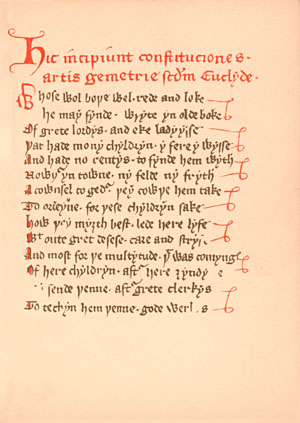En:The Regius Poem Part 3
Inhaltsverzeichnis
Regius Poem
- The Regius Poem
- The Regius Poem Part 1
- The Regius Poem Part 2
- The Regius Poem Part 3
- The Regius Poem Part 4
- The Regius Poem Part 5
- The Regius Poem Part 6
- The Regius Poem Part 7
Fifth article
The fifth article is very good,
So that the 'prentice be of lawful blood;
The master shall not, for no advantage,
Make no 'prentice that is deformed;
It is mean, as you may hear
That he have all his limbs whole all together;
To the craft it were great shame,
To make a halt man and a lame,
For an imperfect man of such blood
Should do the craft but little good.
Thus you may know every one,
The craft would have a mighty man;
A maimed man he hath no might,
You must it know long ere night.
Sixth article.
The sixth article you must not miss
That the master do the lord no prejudice,
To take the lord for his 'prentice,
As much as his fellows do, in all wise.
For in that craft they be full perfect,
So is not he, you must see it.
Also it were against good reason,
To take his hire as his fellows do.
This same article in this case,
Judgeth his prentice to take less
Than his fellows, that be full perfect.
In divers matters, know requite it,
The master may his 'prentice so inform,
That his hire may increase full soon,
And ere his term come to an end,
His hire may full well amend.
Seventh article.
The seventh article that is now here,
Full well will tell you all together,
That no master for favour nor dread,
Shall no thief neither clothe nor feed.
Thieves he shall harbour never one,
Nor him that hath killed a man,
Nor the same that hath a feeble name,
Lest it would turn the craft to shame.
Eighth article.
The eighth article sheweth you so,
That the master may it well do.
If that he have any man of craft,
And he be not so perfect as he ought,
He may him change soon anon,
And take for him a more perfect man.
Such a man through recklessness,
Might do the craft scant worship.
Ninth article.
The ninth article sheweth full well,
That the master be both wise and strong;
That he no work undertake,
Unless he can both it end and make;
And that it be to the lords' profit also,
And to his craft, wheresoever he go;
And that the ground be well taken,
That it neither flaw nor crack.
Tenth article.
The tenth article is for to know,
Among the craft, to high and low,
There shall no master supplant another,
But be together as sister and brother,
In this curious craft, all and some,
That belongeth to a master mason.
Nor shall he supplant no other man,
That hath taken a work him upon,
In pain thereof that is so strong,
That weigheth no less than ten pounds,
but if that he be guilty found,
That took first the work on hand;
For no man in masonry
Shall not supplant other securely,
But if that it be so wrought,
That in turn the work to nought;
Then may a mason that work crave,
To the lords' profit for it to save
In such a case if it do fall,
There shall no mason meddle withal.
Forsooth he that beginneth the ground,
If he be a mason good and sound,
He hath it securely in his mind
To bring the work to full good end.
Eleventh article.
The eleventh article I tell thee,
That he is both fair and free;
For he teacheth, by his might,
That no mason should work by night,
But if be in practising of wit,
If that I could amend it.
Twelfth article.
The twelfth article is of high honesty
To every mason wheresoever he be,
He shall not his fellows' work deprave,
If that he will his honesty save;
With honest words he it commend,
By the wit God did thee send;
But it amend by all that thou may,
Between you both without doubt.

